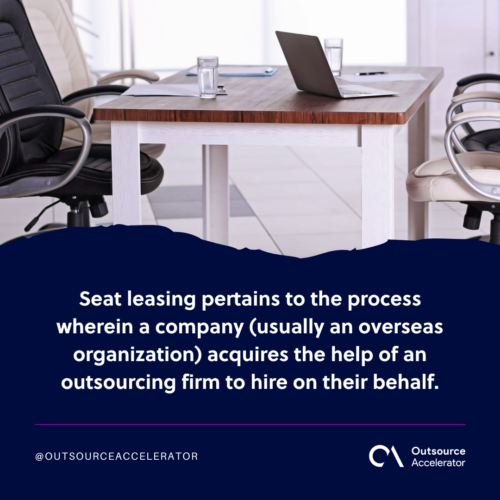Seat leasing and virtual offices: The future of working spaces

Seat leasing isn’t a new trend but more and more companies are jumping on it.
In today’s world wherein hybrid work setups are much more preferred, having options to work whenever and wherever you are is nice.
What is seat leasing?
Seat leasing pertains to the process wherein a company (usually an overseas organization) acquires the help of an outsourcing firm to hire on their behalf.
Seat leasing allows companies to scale up and expand as fast as possible without worrying too much about overhead expenses.
Cold seat leasing vs warm seat leasing
Cold seat leasing only includes the equipment—workstations, desks, the production floor. This strategy works perfectly with companies that already have a team to occupy the newly gained space.
On the other hand, warm seat leasing includes employees and workers already. This is perfect for companies looking to expand their offshore team.

Advantages of seat leasing
One of the more obvious advantages of seat leasing is that you’ll already have another team on hand. It’s not surprising that most overseas companies use leasing as the first phase of their international expansion.
In addition, here are other advantages of seat leasing:
Modern facilities
From top-of-the-line equipment to modern office facilities such as pantries, function rooms, recharge rooms, most seat leasing companies have this covered.
Ready-to-use function rooms
Speaking of function rooms, companies that offer either warm and cold leasing usually have 100% working function rooms.
These rooms may be as simple as a long office desk and a board, but what matters is teams can regroup in it with no distractions.
More cost-effective than renting
Thinking about renting an entire floor (or two)? Consider seat leasing first.
Come to think of it, with renting, your company has to supply most, if not all, equipment. You would also have to pay for utilities, rent, and association dues that are written on the contract.
Seat leasing, on the other hand, is so much more cost-effective and less expensive than renting a whole office space. No more thinking about rent and other overhead expenses!
Flexibility
Acquiring a new table when you’re on a contract is easy. This is true especially if you’ve partnered up with a business process outsourcing company that offers such a service.
This kind of flexibility also allows your business to expand rapidly.
Can start operating ASAP
Eager to start working already? Once the contract is signed and approved, most leasing companies allow their partners to move into their additional office space.
If the contract is for warm seat leasing, back-office employees can start working already, if they were onboarded already. If it’s for cold leasing, your employees can familiarize themselves with the layout of their new office.
What is a virtual office?
A virtual office is as simple as it sounds.
It allows remote companies to have a physical address for mailing, function rooms, and sometimes, a coworking space.
This setup is popular for hybrid and fully remote startup companies that want to have a semblance of working at the office but without commitment.
Coworking spaces
Coworking spaces are a hip new trend for freelancers, remote employees, and digital nomads.
When working from the comfort of your own home gets a little too boring, working in a conducive space may bring you the energy you need to finish your tasks.
These spaces are usually catered towards individuals but can be converted to a virtual office as well.
Advantages of having a virtual office
If you and your team are looking for an inexpensive and professional place of work, getting a virtual office may be on the table for you.

No more commuting
Unless the team has to meet up for monthly meetings or weekly catch ups, having a virtual office will give you the flexibility to work remotely, all the while having a physical address.
Some traditional clients like to check for an office address before bringing their business to you.
Productive employees
Working remotely and having the option to work in a coworking space may give you and your team a pleasant change of pace.
According to a recent study, remote employees are more productive at home rather than working in the office.
Hybrid setup
The flexibility of having the choice of working at home and in an office (or a semblance of one) is becoming more and more prevalent.
Employers are coming up with creative ways to keep the team’s rhythm intact during these past few months.
Less overhead cost
Most (if not all) coworking spaces and virtual offices have packages that last for a month. This way, your team can run a few sessions to get the feel of the additional space.
These spaces package their rates accordingly—the facilities, the rooms, and perks.
Which is better: Seat leasing vs. virtual office
This question is heavily reliant on your business needs and your team’s comfortability level.
Seat leasing is a more traditional manner to acquire a working space in a central location in the city of your choosing. On the other hand, having a virtual office is a new way of creating an air of camaraderie amongst virtual teams.
Don’t be afraid to look into both options and ask for other’s input.
Seat leasing and business process outsourcing
It shouldn’t come as a surprise that it’s another form of business process outsourcing. Seat and staff leasing are just as prevalent as outsourcing employees from the other side of the globe.
We know BPO companies for the services they provide for their clients—from back-office support to customer-facing tasks, BPO agencies have it all.







 Independent
Independent




